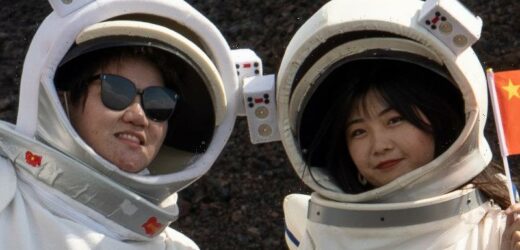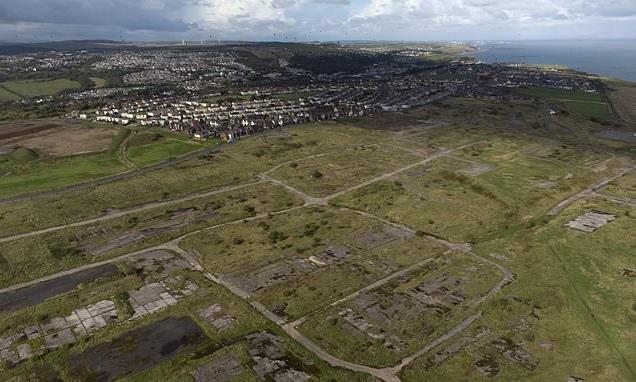Singapore: When Yuan Hong, a retired civil servant from China’s south was in primary school, the Taiwanese air force would dash across the Chinese border and drop propaganda leaflets on the population below.
Some leaflets promoted a mix of economic freedom and civil liberties enjoyed across the Taiwan Strait. Others came with a sharper edge. “We will retake the mainland,” Yuan recalls them saying.
It was the early 1960s and China was in the midst of its disastrous Great Leap Forward campaign. Disease and malnutrition were rife. The People’s Liberation Army was large but poorly organised, China could not match Taiwan’s warplanes in the air and had little chance of winning a war against a neighbour less than 1 per cent of its size.
Tourists wave Chinese national flags on the Qishuiwan Beach in Wenchang Credit:Sanghee Liu
“China was a poor country at that time, it had just finished experiencing the Great Famine,” says Yuan, now aged 70, as she looks out onto Qishuiwan beach on the island of Hainan.
Yuan struggles to comprehend the changes her country has undergone in her lifetime, labelling them “earth-shaking” as she watches its latest rocket – the Long March 5B – take off from the Wenchang launch site on the island’s northern tip.
“I feel very proud of my motherland. Its powerfulness gives me a lot of comfort and a sense of happiness,” she says. “In the old days, there was a slogan, catch up with the United States. Now, China has become strong and is no longer afraid of the US.”
Within 50 years, China has gone from being an impoverished nation unable to repel Taiwan’s propaganda missions to having territorial ambitions that pose the greatest threat to peace in Asia in generations.
Aircraft of the Eastern Theatre Command of the Chinese People’s Liberation Army (PLA) conduct a joint combat training exercises around the Taiwan Island on Sunday.Credit:Xinhua/AP
For the past two weeks, the People’s Liberation Army has harassed Taiwan’s median line, sending missiles over the democratic island, destroyers to surround its territorial waters and warplanes to simulate attacks on its defence forces. The visit to the island by US House Speaker Nancy Pelosi – seen as an insult to Beijing’s sovereignty – gave China the excuse to practise a military blockade.
“Never before have we been so close to, confident in, and capable of achieving the goal of national rejuvenation,” China’s state council said in a white paper released on Wednesday.
“The same is true when it comes to our goal of complete national reunification.”
Both goals are intrinsically linked. In the Communist Party’s eyes, China cannot be whole until Taiwan is totally under its control. The party has never ruled Taiwan but spent half of the white paper on a history lesson – tracing China’s links to Taiwan back to 230AD. Its claims are strongly refuted by Taiwan, which points to thousands of years of indigenous history and the fact it draws its government from the nationalists who fled Mao Zedong in 1949 to establish their base in Taipei.
China’s patriotic tourists travel to watch the rocket launch in Hainan. Credit:Sanghee Liu
Only 11 per cent of Taiwanese now want to unify with the mainland, but Beijing has made it clear that it is willing to use any means necessary to get its way.
“Use your imagination,” China’s ambassador to Australia Xiao Qian said on Wednesday.
Xiao compared Taiwan to Tasmania in a 90-minute appearance before the National Press Club in Canberra.
“Tasmania was [and] will be part of Australia,” he said. “This involves territorial integrity.”
But he denied the existence of dozens of polls that showed the Taiwanese want to remain separate from China. In doing so, he also dismissed the landslide victory for Tsai Ing-wen’s government in 2020 on the same promise.
Taiwanese President Tsai Ing-wen urged residents to “stay calm and live as normal” during China’s military drills.Credit:AP
Tsai, a bookish trade policy bureaucrat, who rose to become president in 2016 and extend her lead four years later, said she was proud of Taiwan’s resilience.
“Taiwan has always faced many internal and external challenges, but it has always overcome them,” she said on Thursday. “Faced with China’s military exercises, the people of Taiwan have been calm, mature, confident, and supportive of the army.”
But China remains determined to chip away at that confidence through a daily psychological and diplomatic assault on the resistance to unification. By 2027, the US Department of Defence says, China could be ready for war.
John Culver, a former US national intelligence officer for East Asia says it “feels surreal” that the past week of Chinese military drills actually happened.
“China conducted unprecedented blockade rehearsals, for the first time firing missiles over Taiwan, and into waters right off Taiwan’s main commercial ports, without regard to Taiwan’s claimed territorial waters,” he wrote for the Lowy Institute.
“It flew dozens of fighters over the Strait centre line – long a mutually agreed sensitive area. And it likely will keep doing these things, making such actions the ‘new normal’.”
In Asia, where proximity to any future conflict means that regional leaders are acutely aware of how volatile the situation is, Singapore, Indonesia and Australia were alarmed at how far both China and the US were prepared to go.
Australia’s Foreign Minister Penny Wong refused to endorse Pelosi’s trip, an unusual break from bipartisanship with America, and pointedly said “all parties should consider how they contribute to de-escalating current tensions”. It was only when China’s military response escalated sharply last week that she accused Beijing of being “disproportionate and destabilising”.
Australian Foreign Minister Penny Wong.Credit:Joe Armao
Opposition leader Peter Dutton was more direct. “[Xi Jinping] has been very clear about their intention to go into Taiwan by hook or by crook,” the former defence minister said. “That’s a reality that we just can’t ignore.”
In Singapore, Prime Minister Lee Hsien Loong was preparing to step out under a parade of paratroopers, helicopters and air force jets for the country’s national day when he warned a cold geopolitical wind was blowing.
“Around us, a storm is gathering. US-China relations are worsening, with intractable issues, deep suspicions, and limited engagement,” Lee said. “This is unlikely to improve anytime soon. Furthermore, miscalculations or mishaps can easily make things much worse.”
Indonesia said it was deeply concerned with the increasing rivalry among major powers.
“If not managed well, it may lead to open conflict and disrupt peace and stability, including in the Taiwan Strait,” its Foreign Ministry said in a statement. “Indonesia calls on all parties to refrain from provocative actions that may worsen the situation.”
Japan had been among the strongest voices to condemn China’s military actions after missiles landed in its exclusive economic zone – a patch of water south-west of Okinawa that China also claims as its own. Japanese Vice Foreign Minister Mori Takeo got China’s ambassador to Japan, Kong Xuanyou, on the phone to tell him immediately to get Beijing to implement a ceasefire. Then at the Association of South-east Asian Nations meeting in Cambodia, Japan went further by publicly lobbying members to take a stronger stance, a departure from Tokyo’s usual tactic of making its grievances known behind closed doors.
“[This was a] grave incident concerning the security of Japan and safety of its people and its people,” Foreign Minister Yoshimasa Hayashi said after the meeting.
But a split in North Asia was emerging.
On Tuesday, China hosted South Korean Foreign Minister Park Jin in Shandong. Its relatively new President Yoon Suk-yeol had earlier refused to meet with Pelosi because he was on holiday. Park told China’s Foreign Minister Wang Yi that he was open to strengthening relations between the two countries as Beijing announced it would continue its military exercises around Taiwan.
“We should be more mature, independent and stable,” Wang told Park. The two spent a considerable amount of time on supply chains, according to statements from the meetings.
For China, this means one product in particular: semiconductors. The vital chips that help run the world’s consumer and military devices. More than 50 per cent of the world’s supply is made in Taiwan. South Korea is another key exporter, and the US wants Seoul to join its chip alliance, with Japan and Taiwan but South Korea has so far been reluctant.
“Park’s visit is a win for China, which has actively been trying to court recently elected Korean President Yoon,” said policy research firm Trivium China. “Most countries in Asia – including US allies – don’t want to pick sides between Beijing and Washington.”
The trajectory of China’s ambitions may not leave them much choice.
The US Navy is set to send ships into the Taiwan Strait within the next month, The New York Times reported on Wednesday. The Chinese army’s Eastern Theatre Command declared an end to the official exercises on Thursday but said it would continue “military training for war preparedness” indefinitely.
Taiwan has been holding live-fire drills in response to China’s military exercises around the island.Credit:Getty
The day before China’s state council released its white paper on Taiwan – the first in 20 years.
“This is a significant policy document,” said Amanda Hsiao, a senior China analyst at the International Crisis Group.
Hsiao said it showed the Communist Party’s plans were not only about overcoming the national humiliation of losing Taiwan but also its future strategic interests in establishing control over the most important parcel of land in the first island chain, the gateway to the Pacific.
The paper emphasised rewards for collaborators in Taiwan and punishment for those who resisted Chinese occupation in a push to further divide the local population. It proposed implementing the “one country, two systems” model used in Hong Kong that is supposed to guarantee a “high degree of autonomy” but has bound Hong Kong’s legal, education and political systems to the mainland over the past three years.
“[The] details suggest ‘one country, two systems’ may involve less political autonomy for Taiwan than before, making an untenable political proposition even more untenable for Taiwan,” said Hsiao.
The tide of Chinese nationalism is now going to be very difficult to put back in the bottle.
Significantly, the document removed a commitment contained within the two previous Taiwan white papers in 1993 and 2000 that guaranteed Beijing would not send troops and administrative personnel to Taiwan if it unified with the mainland.
And it burnished Xi’s legacy in the lead-up to the National Party Congress expected to take place in November where he will secure a third term as president.
“Perhaps China got what it needed,” said Culver. “A big strong show for its domestic audience, richly covered on domestic media, that sates nationalistic appetites and will keep things calm through the 20th Party Congress expected in November, when Xi Jinping will begin his third term as leader of everything.”
But the show of force, war propaganda and exultation of national destiny has unleashed a tide of Chinese nationalism that is now going to be very difficult to put back in the bottle.
Hu Xijin, the jingoistic former editor of The Global Times had whipped up Chinese nationalists into a frenzy by suggesting Pelosi’s plan was going to be shot down by the PLA. Online, commentators described the response as “weak” as they struggled to come to terms with military exercises that for now were all smoke, no fire.
In Hainan, Zhu Yaling, a public servant from Kunming, watched with her son as the Long March 5B blasted off in late July. Her four-year-old spontaneously started singing the national anthem as the rocket soared into the atmosphere.
Tourists gather in Hainan to watch the Long March 5B rocket take off. Credit:Sanghee Liu
“I’ve never taught him about this, so I guess he watched too many relevant videos and learnt at kindergarten,” she said.
Zhu is lyrical about what it means to see it in person.
“It was like an arrow off the bow, soaring into the space, leaving a cluster of orange-red flames from the powerful blast,” she says. “At that moment, everyone started cheering and felt proud of the powerful motherland!”
Nearby, Du Rufeng, a former PLA sailor from Guangzhou was overcome with emotion.
Patriotic tourists dress up as astronauts to watch the rocket launch in Hainan. Credit:Sanghee Liu
“At the moment of the rocket blast-off, I choked up,” he says. “I felt the powerfulness of our country, efforts and sacrifices made by scientists and technicians, and the unity of the Chinese people.”
Chinese, Western and Asian analysts believe the Communist Party is getting closer to having the military capability to take Taiwan. If it chooses to act, it will need the loyalty of its people for a war that could cost hundreds of thousands of lives. There is no shortage of patriotism on the beach in Hainan, in China’s universities or its institutions. Pelosi’s visit helped light a fuse that could lead to a powderkeg.
“I’ve seen very little acknowledging that so many things taken for granted that contributed to peace, commerce and stability on the strait can now be challenged as China seeks to test how far it can go, in every domain,” said Culver.
“The coming autumn will bring brisker air, and all concerned will stir and start to realise that the situation fundamentally changed, and the peace some thought would last until 2027, 2049 or forever can change in 24 hours over what seems the silliest of reasons.”
Get a note directly from our foreign correspondents on what’s making headlines around the world. Sign up for the weekly What in the World newsletter here.
Most Viewed in World
From our partners
Source: Read Full Article










